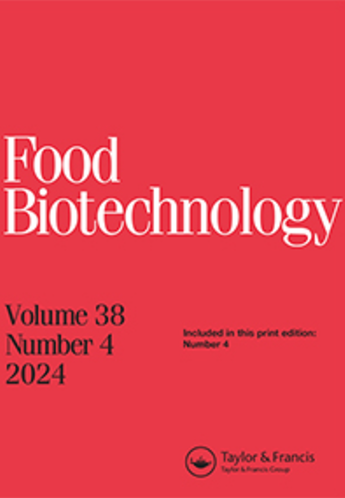Isolation and selection of fructose-consuming lactic acid bacteria associated with coffee bean fermentation
IF 1.6
4区 农林科学
Q4 BIOTECHNOLOGY & APPLIED MICROBIOLOGY
引用次数: 6
Abstract
ABSTRACT The discrepancy between glucose over fructose metabolism during coffee fermentation can delay the drying process and stimulate the development of undesirable microorganisms. In this study, 26 lactic acid bacteria (LAB) isolated from laboratory-scale coffee fermentation were screened for their capacity to preferentially consume fructose over glucose and identified by 16S rDNA sequencing. Ten fructose-consuming isolates were identified as Levilactobacillus brevis (n = 8) and Pediococcus pentosaceus (n = 2). The growth characteristics of three Lev. brevis strains (LPBF01, LPBF03 and LPBF06) were classified as “facultatively” fructophilic bacteria, i.e., they grew on glucose without an external electron acceptor (oxygen, fructose, or pyruvate) but grew more rapidly on fructose. Lev. brevis LPBF03 was characterized for producing a high content of flavor-active esters (1-butanol, benzaldehyde, 2-nonenal, and 2-pentanone) and now being targeted as a good candidate to improve fructose consumption and aroma formation during coffee fermentation.与咖啡豆发酵相关的果糖消耗乳酸菌的分离与筛选
摘要咖啡发酵过程中葡萄糖代谢与果糖代谢之间的差异会延迟干燥过程,并刺激不良微生物的发展。在本研究中,从实验室规模的咖啡发酵中分离出26种乳酸菌(LAB),筛选出它们优先消耗果糖而不是葡萄糖的能力,并通过16S rDNA测序进行鉴定。鉴定出10株果糖消耗菌株,分别为短乳杆菌(n=8)和戊糖球球菌(n=2)。三个Lev。短毒株(LPBF01、LPBF03和LPBF06)被归类为“兼性”亲果细菌,即它们在没有外部电子受体(氧、果糖或丙酮酸盐)的葡萄糖上生长,但在果糖上生长更快。Lev。brevis LPBF03的特征是产生高含量的风味活性酯(1-丁醇、苯甲醛、2-壬烯醛和2-戊酮),现在被视为改善咖啡发酵过程中果糖消耗和香气形成的良好候选者。
本文章由计算机程序翻译,如有差异,请以英文原文为准。
求助全文
约1分钟内获得全文
求助全文
来源期刊

Food Biotechnology
工程技术-生物工程与应用微生物
CiteScore
3.80
自引率
0.00%
发文量
15
审稿时长
>12 weeks
期刊介绍:
Food Biotechnology is an international, peer-reviewed journal that is focused on current and emerging developments and applications of modern genetics, enzymatic, metabolic and systems-based biochemical processes in food and food-related biological systems. The goal is to help produce and improve foods, food ingredients, and functional foods at the processing stage and beyond agricultural production.
Other areas of strong interest are microbial and fermentation-based metabolic processing to improve foods, food microbiomes for health, metabolic basis for food ingredients with health benefits, molecular and metabolic approaches to functional foods, and biochemical processes for food waste remediation. In addition, articles addressing the topics of modern molecular, metabolic and biochemical approaches to improving food safety and quality are also published.
Researchers in agriculture, food science and nutrition, including food and biotechnology consultants around the world will benefit from the research published in Food Biotechnology. The published research and reviews can be utilized to further educational and research programs and may also be applied to food quality and value added processing challenges, which are continuously evolving and expanding based upon the peer reviewed research conducted and published in the journal.
 求助内容:
求助内容: 应助结果提醒方式:
应助结果提醒方式:


